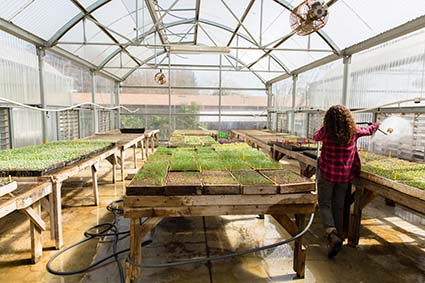Three UC Santa Cruz research teams led by engineering faculty will pursue innovative agriculture technology projects with the support of seed grants from the United States Department of Agriculture’s (USDA) Agriculture and Food Research Initiative (AFRI).
Faculty and student researchers will work in interdisciplinary teams to create new technologies that address important agricultural and environmental needs. Each project was awarded $300,000 in funding over a two-year period, for a total of $900,000 in funding among the projects.
These grants build upon UCSC’s long history of thoughtful leadership in agroecology and sustainable food systems, marked by a recent $10 million grant, and will further Baskin School of Engineering priorities of developing technology for societal benefit.
Better leaf wetness sensors for crops
Lead Principal Investigator: Professor of Electrical and Computer Engineering (ECE) Marco Rolandi
Co-Principal Investigators: Professor of Environmental Studies Gregory Gilbert, Assistant Professor of ECE Colleen Josephson
When plants get wet, they are at risk of developing disease, limiting crop output in agricultural settings and potentially causing ecological damage in the wild. The team of researchers are continuing to develop sensors that use a biomimicry approach to provide better measurements of leaf wetness than what current state-of-the-art technology can provide.
These fairly inexpensive sensors can provide measurements for any leaf type which can help guide disease forecasting and improve crop management. The researchers envision them as an extremely helpful tool for both large and small organic farms. With this funding, the team will focus on optimizing their leaf sensors for commercially relevant crops such as strawberries, fava beans, spinach, and maize (corn).
Microbial sensors for monitoring soil health
Lead Principal Investigator: Assistant Professor of ECE Colleen Josephson
Co-Principal Investigators: Pat Pannuto (UC San Diego), George Wells (Northwestern University), Neal Blair (Northwestern University)
The soil microbiome is an important aspect of overall soil health, yet we don’t currently have an easy way to monitor the activities of this microbiome in real time. “Mud batteries,” also known as microbial fuel cells, generate electrical signals in response to microbe activity in the soil. The power output of the batteries fueled by bacteria could give clues to the health of the soil – a lower output might indicate that the soil is not a healthy environment for the crops that are planted in it.
This project focuses on the development of a new way to gain insights into soil health by monitoring the electrical output of these microbes, alongside other environmental conditions. Josephson’s team will use this funding to advance the development of mud battery-based soil sensors.
Guidance for using autonomous vehicles to monitor sensors on farms
Lead Principal Investigator: Assistant Professor of ECE Steve McGuire
Co-Principal Investigator: Assistant Professor of ECE Colleen Josephson
Sensors on farms can serve a variety of purposes, such as temperature and soil moisture monitoring. These sensing systems can improve how farmers allocate resources on the land and reduce environmental damage. However, the costs associated with building out infrastructure to fully implement dense sensor networks are an expensive barrier to entry. This project focuses on improving the link between soil modeling and sensor data sampling, paving the way for a farm with a large number of sensors out of which only a few might be read at any given time.
McGuire’s team will leverage autonomous aerial and ground vehicles to enable future agricultural methods based on gathering data from sensors more effectively. These data are then fed back into soil modeling to form a complete picture of the ecology of the farm, leading to improved decision making. As a result of this work, the team will develop fundamental technologies for precision agriculture to improve agricultural outcomes while reducing resource usage.
Nearly $1 million in USDA grants will support 3 UCSC-led agricultural technology projects



